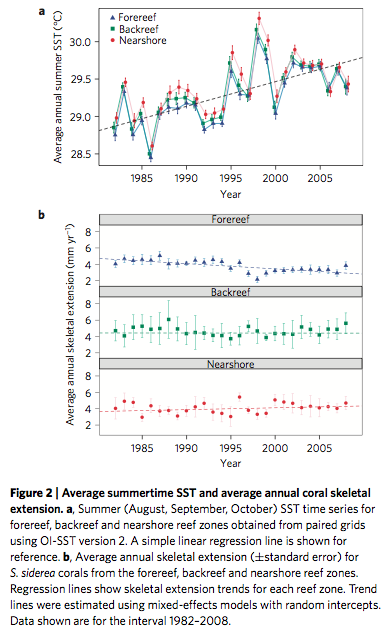Three of my UNC colleagues (including Karl Castillo and Justin Ries) just published an excellent paper in Nature Climate Change (Castillo et al. 2012) “Decline of forereef corals in response to recent warming linked to history of thermal exposure“.
The team used a large pneumatic drill to extract cores from 13 colonies of Siderastrea siderea off southern Belize. Cores were taken from colonies in the forereef, backreef, and nearshore environments. They then used the cores to estimate skeletal accretion and compared that with the thermal history at each site (based on in situ data loggers). The forereef corals have not been exposed to high temperatures like colonies in shallower environments, and thus appear more thermally sensitive (which is concordant with many other studies). As the Belizean Barrier Reefs warms, the growth rate of the forereef corals declines, while that of the backreef and nearshore colonies remains unchanged (and may even have increased).
“It looks like forereef corals are the first of this species to be affected on this reef system, suggesting that they may be most vulnerable to recent and future global warming,” Castillo said. “However, because backreef and nearshore coral colonies have historically been exposed to warmer and more variable seawater temperatures, they seem to be less affected.”
Abstract: Rising ocean temperatures have reduced rates of coral calcification and increased rates of coral mortality, thereby negatively impacting the health of coral reef ecosystems. Nevertheless, the response of corals to thermal stress seems to vary spatially across the reef environment. Here, we show that between 1982 and 2008 in the western Caribbean Sea, skeletal extension within forereef colonies of the reef-building coral Siderastrea siderea declined with increasing seawater temperature, whereas extension rates of backreef and nearshore colonies were not impacted. These results suggest that forereef S. siderea corals are more vulnerable to ocean warming than their backreef and nearshore counterparts. This may arise from backreef and nearshore coral colonies experiencing greater baseline diurnal and seasonal thermal fluctuations than forereef colonies, which may promote acclimatization and/or adaptation to more recent anthropogenic thermal stress. These findings reveal how corals have responded to recent anthropogenic warming, offer insights into how they are likely to respond to future warming and highlight the importance of understanding cross-reef differences in coral thermal tolerance for managing coral reef ecosystems in an era of rapid regional and global climate change.
[youtube]http://www.youtube.com/watch?v=L7-JWxVD1iQ&[/youtube]

Leave a Reply